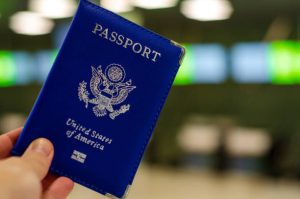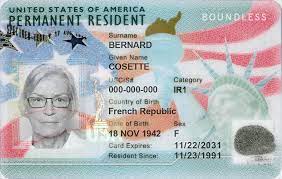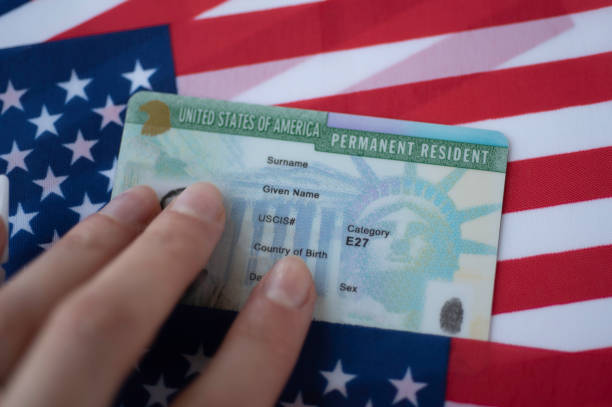The U. S green card enables an individual to reside, work, and begin the naturalization procedure in the country. This cardholder is considered a permanent resident of the U.S. and is therefore qualified for many, but not all, of the same advantages as citizens.
More than a million green cards are granted by the American government each year. An estimated 13.9 million people with green cards had legal permanent resident status in the U.S. as of 2019, and 9.1 million qualified to apply for citizenship.
Continue reading this article to get more knowledge about the US Green card.
See the 15 Top Best Surfing Spots In United State of America
What Is U. S Green Card?
A green card enables a person who is not an American native to establish permanent residency there. A lifelong resident card is another name for a green card. Because a green card would give them permanent resident status, allowing them to live and work anywhere in the country and become eligible for citizenship after three or five years, many people outside the United States want one.
More than a million green cards are issued by the American government each year. Family members of American citizens and present holders of green cards receive most of these benefits, with foreign workers looking for work in the U.S. making up the next largest group of recipients.
Check Top 10 Most Popular Sports in America (USA)
Benefits Of U. S Green Card
- You cannot be expelled from the nation of your birth. No matter what modifications to immigration rules may be made, those with green cards keep their status as permanent residents. A permanent green card cannot be revoked if immigration rules change. However, a bearer of a green card may forfeit their right to remain in the country by committing a crime, breaking the law, or taking any other action that may lead to deportation.
- You are not required to give up your citizenship in your home nation.
- The laws of the United States, your home state, and your municipal jurisdiction all provide you with legal protection. Those given permanent residence enjoy the same legal protections as American citizens.
- Every ten years, you can refresh your green card.
- You can access journeys to and from the U.S. more easily than other visa holders or recent immigrants.
- With a current green card, permanent citizens can leave the country and return within a year.
- You can move anywhere in the United States and the journey there.
- There is no need to contact civil or state government organizations, and state boundaries are not a restriction.
- You are qualified to receive government benefits like education grants or social security.
- Applicants for government-sponsored student financial assistance must be permanent residents. Additionally, some colleges and institutions grant in-state or resident tuition rates to green card holders.
Read Highest Paying Jobs In USA
How Do I Qualify for The U. S Green Card?
You must begin the Green Card application process after studying the different categories of U.S. immigrant visas and their requirements and choosing the one you can apply for. There are a few stages you must complete for the majority of Green Card applications, as listed below:
1. Have a sponsor letter ready.

A family friend or employer may serve as your sponsor. Form I-130, Petition for Alien Relatives, is used for family-sponsored petitions, and Form I-140, Immigrant Petition for Alien Worker, is used for petitions based on work. The petition must be submitted to U.S. Citizenship and Immigration Services (USCIS), and the Green Card fee must be made.
2. Take the NVC package

Upon approval of your petition, NVC will give you a package. USCIS will review the case and decisions regarding your eligibility. If your petition is approved, your papers will be sent to the National Visa Center (NVC), giving you a package to your home country. All directions and forms that you need to complete for your application are included in the package. NVC will deliver this parcel once your priority date is current.
3. Visit the U.S. embassy to request a passport.

You must follow the directions in the NVC package and apply for the visa at the U.S. Embassy in your home country after paying all required application fees. Along with having your visa interview, you will also present supporting documentation.
4. Visit the U.S.

After completing all the necessary procedures, if your visa is approved, the U.S. Embassy will issue you an arrival package, which you must bring with you when you travel to the U.S. Although you must carry it with you when you first arrive in the U.S., you cannot open the arrival package.
The only person authorized to open it and decide on your entry into the U.S. is a U.S. immigration officer at a port of entry.
A visa does not ensure that you will be permitted entry into the U.S., so keep that in mind. Immigration authorities control any port of entry into the U.S.
Also: Canada Visa Lottery
What Possibilities Exist For Getting A U. S Green Card?
You can choose from the following alternatives with the assistance of our immigration lawyers to obtain permanent residency in the United States.
1. Family-Based Green Card

Suppose you are a U.S. citizen’s close cousin. In that case, your family member may be able to assist you in getting a green card by filing an I-130 petition with U.S. Citizenship and Immigration Services (USCIS) on your behalf.
You will be on a visa waiting list if USCIS accepts the petition. In a specific order of preference, family members of American citizens are granted visas as they become available, with unmarried, adult children receiving the greatest precedence.
After getting your visa, a member of your family who is a citizen of the United States may apply to change your immigration status from an alien to a permanent resident, which results in the issuance of a green card. Alternatively, you can apply to change your status through consular processing in your home nation.
2. Adoption-Based Green Card

When a child under 16 has been adopted from abroad and has been in your care for at least two years, you may ask them to be granted a visa.
Once you have it, you can start the procedure to change your immigration status to permanent resident.
3. Religious Service Green Card

Do you intend to work for a US-based nonprofit faith organization? If so, the company may submit a green card petition so you can reside and operate in the United States.
You must have been a member of your religious organization for at least two years to be eligible. You must also have two years of recent experience in the same occupation or trade you will use in the United States.
4. Green Card via Asylum or Refuge

Suppose you entered the United States lawfully or illegally because you feared persecution, torture, or death in your home country due to your religion, nationality, race, or other social characteristics. In that case, you could file an asylum petition. Additionally, the United States offers asylum to a specific number of immigrants each year fleeing conflict, famine, or civil unrest in their native countries.
Visas for refugees and asylum seekers are uncommon; you must demonstrate that your requirements are humanely important and that your worries of harm or persecution are valid. If you are granted a visa based on seeking asylum or seeking refuge, you can then apply for permanent citizenship after staying in the country for a year
5. Employment-Based Green Card

A U.S.-based employer may apply for you to be granted a green card so you can reside and work there if they have hired you. But before doing so, your employer must agree to pay you a reasonable wage and confirm that no other qualified U.S. citizens can take your place. There are numerous employment-based permits available, including:
- EB-1 Visa: An EB-1 visa may be available if you have “extraordinary talent” in business, education, athletics, science, or the arts. Additionally qualified are exceptional researchers and internal transfers.
- EB-2 Visa: If you have an advanced degree or your work has the potential to significantly advance the economy, welfare, culture, or educational goals of the United States, your company may support your application for an EB-2 visa.
- EB-3 Visa: If you have a bachelor’s degree, at least two years of professional work experience, or less than two years of experience in unskilled work but work in an area where there aren’t enough qualified workers in the United States, you may be eligible for an EB-3 visa.
- EB-4 Visa: Only religious employees are eligible for EB-4 visas. You must be a part of a religious group with a nonprofit organization operating in the United States to be qualified to apply. Before submitting an EB-4 visa application, you must also be a registered member of that nonprofit group for at least two years.
- EB-5 Visa: You might qualify for an EB-5 visa if you intend to spend a sizable amount on an American business. Interested applicants should know several additional requirements and procedures for an EB-5 visa.
Documents Required For a U. S Green Card Application
You might only need some of these papers (for instance, if you’re applying as an immigrant investor, you won’t need a marriage certificate, and if you’re asking for a marriage-based green card, you won’t need evidence of a job offer).
The following list, however, will help you get begun gathering the proper paperwork for your USCIS green card application:
- birth certificate
- Judicial documents
- U.S. visas that are valid or canceled
- death record for the previous partner
- divorce judgment
- financial records
- Records of immigration offenses
- a marriage license
- papers relating to medical exams
- military history
- police approval document
- police reports
- Criminal history
- Evidence of a genuine union
- Verification of investment money
- Evidence of a genuine union
- Verification of investment money
- Authentication of your legal entrance into the United States
- your present immigration status as evidence
- proof of your sponsor’s legal permanent resident status or U.S. citizenship
- current visa
What You Should Understand About U.S Green Cards
You should know the following details about the U. S Green cards:
- They must be replaced when they run out: Typically, green cards are good for ten years. It would help if you reapplied to keep your position as a permanent resident after your card expires. Renewal applications must be submitted within six months of the expiry date. Both online and postal applications may be made.
- No signature is required: The USCIS will suspend the requirement to sign if the permanent resident is under 18 years old or suffers from a disability that makes it impossible for them to do so. Once authorized, the signature area will read “signature waived.”
- They may involve conditions: Only two years are allowed to use conditional green cards. You have 90 days from the card’s expiration to submit an appeal for a change in status to convert your conditional card to a permanent one. Your residency status will be revoked unless the appeal is submitted.
- You are not given the same privileges as a citizen: The state offers many social advantages, including insurance, grants, and social security, to people with green cards. However, green card holders cannot cast ballots, compete for office, or submit applications for some federal jobs.
Other Things To Know About The U. S Green Card
Permanent residents do not have all the privileges of a citizen because they are not U.S. citizens, despite having the ability to live and work in the country and receiving most of the same benefits. Constraints include:
- Voting rights are not available to those with green cards.
- Instead of American citizens, holders of green cards have lower precedence when sponsoring members of their families for green cards.
- Children born outside the country wait to receive green cards, which are not transferable.
- Citizens with green cards cannot compete for political office.
- Every ten years, green card users are not given a U.S. passport.
- The same taxes that would be levied on a U.S. citizen giving up citizenship are levied on green card holders who depart the country permanently after eight years or more.
- Green card users do not always have complete immunity from deportation. To be clear, if U.S. immigration legislation changes, holders of green cards are not subject to deportation.
- Every ten years, green certificates need to be updated.
U. S Green Card Frequently Asked Questions
How is it challenging to get a U. S Green Card?
Getting a green card is challenging, no matter how you go about it. A green card application can be a very drawn-out and challenging procedure. Mistakes could cost you a lot of money and years of work. You might also face criminal charges, deportation, and a lifetime ban on visiting the U.S. due to it.
How soon after receiving my U. S Green Card may I file for citizenship?
A Permanent Resident (Green) Card must be held for a minimum of five years or three years if the applicant is the partner of an American citizen.
Does U. S Green card lose their validity?
Although some Green Cards, also known as Permanent Resident Cards, do not have expiration dates, most are good for ten years. The card is only valid if you have been given conditional permanent resident status and is only good for two years. Keeping your license current is crucial.
Are citizens automatically granted U. S green card?
An immigrant to the United States can become a citizen through the naturalization procedure. However, only a few people qualify those who satisfy different military service requirements or have had a green card (permanent resident status) for 3-5 years.
Can I obtain a green card if my kid is born in the U.S.?
And no, that’s not the solution. The child must be of the appropriate age before you can apply for a green card based on your connection with a U.S. citizen child. For example, a child can only apply for a green card on behalf of a parent under current legislation once they are 21 years old.
How much does a green card application cost?
An applicant residing in the United States must pay $1760 in filing costs for a family-based green card, while an applicant residing outside the country must pay $1200. The usual fee for the necessary medical examination, which differs depending on the provider, is not included.
Conclusion
In conclusion, I believe that the United States Green Card is a great option for any family who wants to immigrate to the United States. It protects you from deportation and gives you a lot of freedom in terms of employment. It is also very easy to obtain, so you can start working for yourself or your family immediately.
